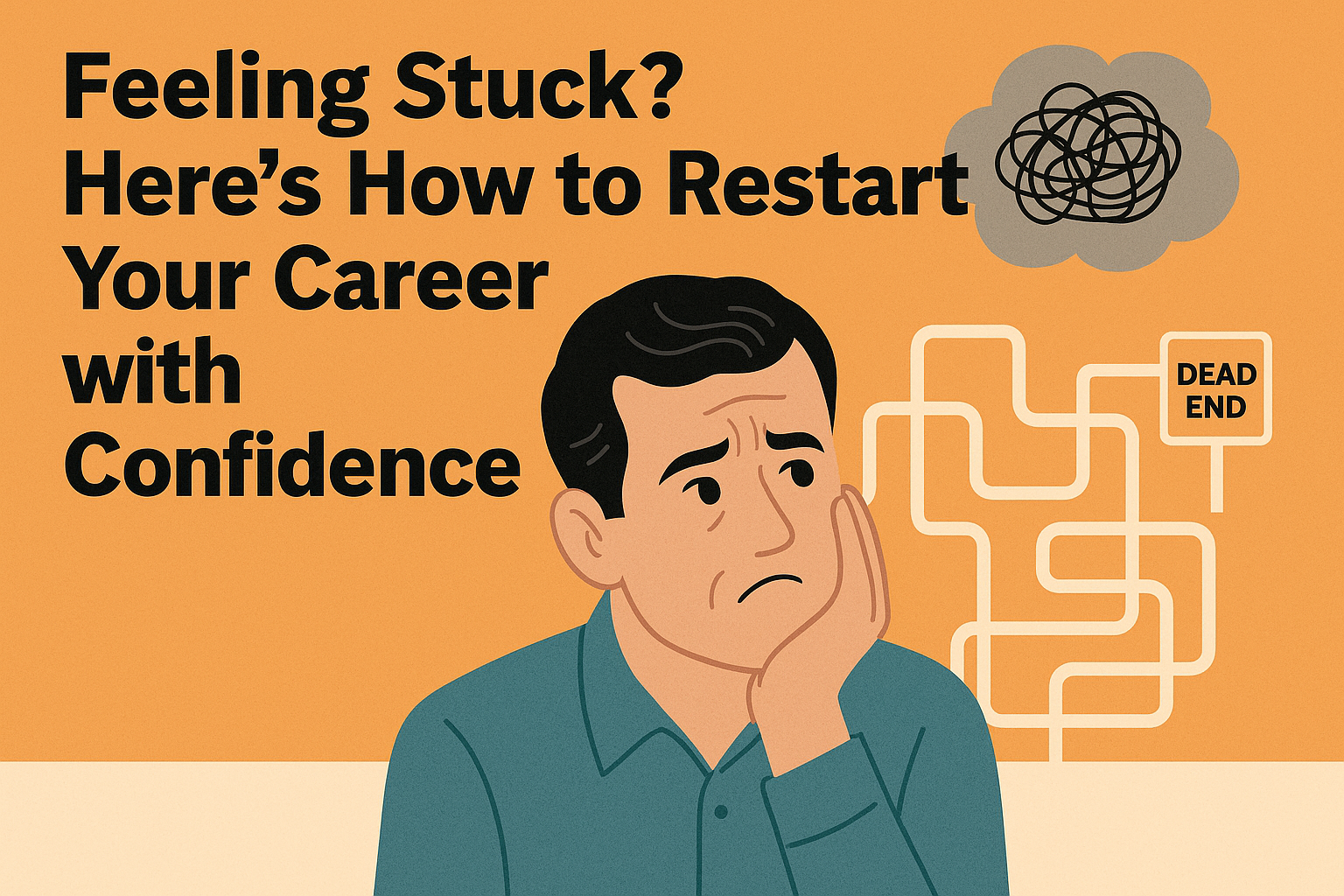Feeling Stuck? Here's How to Restart Your Career with Confidence

If you’re waking up dreading the workday, constantly questioning your professional path, or simply feeling unmotivated and unfulfilled—you’re not alone. At some point, nearly every professional hits a phase where their career feels like it’s standing still. The job that once energized you now feels like a dead end. But here’s the truth: feeling stuck is often the first sign that you’re ready for a breakthrough.
Restarting your career doesn’t mean throwing everything away. It means recalibrating, redefining success on your own terms, and making bold, intentional moves toward something better. This comprehensive guide will help you unpack why you feel stuck and provide you with actionable steps to restart your career with clarity and confidence.
1. Recognize the Signs That You’re Stuck
Before taking action, it’s important to confirm that your feelings aren't just a temporary slump. Signs you’re stuck include:
- You dread Mondays (and every other workday)
- You’re no longer learning or growing
- Promotions and opportunities keep passing you by
- You feel invisible or undervalued
- You fantasize about quitting (but don’t know what else to do)
If any of these resonate, it’s time to take charge.
2. Identify the Root Cause
Different problems require different solutions. Are you stuck because of:
- A toxic work environment?
- Lack of career progression?
- Mismatch between your values and the company’s?
- Loss of interest in your field?
- Burnout or mental fatigue?
Use journaling or a mind-mapping tool like Miro to visually explore what's really holding you back.
3. Reflect on What You Truly Want
Clarity is key. Ask yourself:
- What kind of work energizes me?
- What type of people do I enjoy working with?
- What lifestyle do I want—remote, flexible, structured?
- What problems do I enjoy solving?
Take career assessments like:
4. Reframe the Narrative
Feeling stuck can feel like failure—but it isn’t. It’s a signal for growth. Successful people reinvent themselves often. Oprah, Jeff Bezos, and Vera Wang all pivoted careers after age 30.
Instead of "I'm lost," try saying: "I'm evolving."
Quote to Remember:
“It’s never too late to be what you might have been.” – George Eliot
5. Conduct a Skills & Gap Analysis
Inventory your skills:
- What do you already know?
- What are you great at?
- What are transferable to other roles?
Then identify gaps:
- What’s missing for the role/industry you want?
Use job boards like Indeed, LinkedIn Jobs, and Glassdoor to analyze job descriptions and spot common requirements.
Tool: Use a spreadsheet or Notion template to map your current vs. target skillset.
6. Upskill with Intention
Don’t randomly take courses. Learn skills aligned with your next step.
Top platforms:
Focus on high-demand areas:
- Digital marketing
- UX/UI design
- Project management
- Data analysis
- Communication & leadership
Micro-Certifications: Consider short certifications like Google Career Certificates or HubSpot Academy.
7. Explore Without Pressure
You don’t need to quit your job to start exploring. Test the waters:
- Freelance in your area of interest on Upwork
- Volunteer for side projects in other departments
- Start a blog or portfolio
- Join industry groups or forums
Case Study: Priya’s Restart
Priya, 33, worked in HR for nearly a decade. Although stable, she found no joy in her work. On weekends, she loved creating Canva graphics and running her small Instagram page about mental health.
She began learning digital marketing via free Google courses, started managing social media for a local nonprofit, and created a basic portfolio using Carrd. Within six months, she had her first freelance client. One year later, she left her job to work full-time in digital content marketing.
Takeaway: You don’t have to leap blindly—you can pivot with purpose.
8. Rework Your Resume and LinkedIn Profile
Your professional brand should reflect where you want to go, not just where you've been.
Tips:
- Use a strong headline: e.g., "Project Manager | Digital Ops | Process Optimization"
- Focus on achievements, not duties
- Customize your resume for each job
Tools:
- Zety Resume Builder
- Resume Worded for profile scoring and optimization
9. Build or Rebuild Your Network
Don’t wait until you need a job to start networking.
How to start:
- Reconnect with old colleagues
- Join LinkedIn or Slack communities in your target industry
- Attend virtual meetups or webinars (Meetup.com)
Be genuine. Ask questions. Share your journey.
Bonus Tip: Post regularly on LinkedIn about what you’re learning or exploring—this builds visibility and opens doors.
10. Set a 90-Day Career Reset Plan
Break the inertia with a structured plan:
Month 1: Self-Discovery
- Journal about what’s not working
- Take career assessments
- Research possible paths
Month 2: Skill Building & Exploration
- Enroll in one course
- Volunteer or freelance on one project
- Connect with 10 people in your desired field
Month 3: Branding & Outreach
- Update resume & LinkedIn
- Apply to 5-10 relevant roles
- Attend one industry event
Template: Use a tracker like Trello or Notion to stay accountable.
11. Don't Be Afraid to Ask for Help
You don’t have to go it alone. Career coaches, mentors, and peer support groups can provide accountability and new perspectives.
Look for:
- Free mentoring platforms: PushFar, MentorCruise
- Local career centers or job clubs
- Alumni networks from your university
12. Manage the Emotional Rollercoaster
Change is scary. It brings imposter syndrome, anxiety, and doubt. But growth requires discomfort.
Coping Tips:
- Practice mindfulness (try Headspace)
- Set micro-goals and celebrate small wins
- Journal daily wins and learnings
- Surround yourself with positive influences
Feeling stuck doesn’t mean you're failing—it means you're ready to grow. A career restart isn’t about tearing everything down; it’s about rebuilding better with the wisdom and experience you now carry.
You don’t need all the answers to take the first step. Start small. Explore consistently. Build intentionally. And know that the best chapters often come after the hard pivots.
More from UJ+:
- 10 Career Mistakes to Avoid in Your 20s and 30s
- How to Choose the Right Career Path When You’re Unsure
- Tools to Help You Plan a Career Pivot
Stay connected with UJ+ for smarter strategies, success stories, and practical guidance for wherever you are in your career journey.

